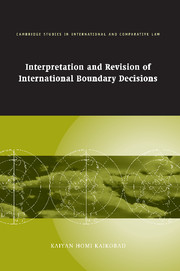Book contents
- Frontmatter
- Contents
- List of maps
- Preface
- Acknowledgments
- Table of cases
- List of abbreviations
- Part I Introduction
- Part II The settlement of territorial and boundary disputes
- Part III Judicial remedies: interpretation
- Part IV Judicial remedies: revision
- 7 The revision of judgments and awards
- 8 General features of revision
- 9 The classification of the notion of revision
- 10 Issues of admissibility
- 11 Selected substantive and procedural aspects of revision
- Part V Conclusions
- Select bibliography
- Index
- CAMBRIDGE STUDIES IN INTERNATIONAL AND COMPARATIVE LAW
8 - General features of revision
Published online by Cambridge University Press: 14 September 2009
- Frontmatter
- Contents
- List of maps
- Preface
- Acknowledgments
- Table of cases
- List of abbreviations
- Part I Introduction
- Part II The settlement of territorial and boundary disputes
- Part III Judicial remedies: interpretation
- Part IV Judicial remedies: revision
- 7 The revision of judgments and awards
- 8 General features of revision
- 9 The classification of the notion of revision
- 10 Issues of admissibility
- 11 Selected substantive and procedural aspects of revision
- Part V Conclusions
- Select bibliography
- Index
- CAMBRIDGE STUDIES IN INTERNATIONAL AND COMPARATIVE LAW
Summary
Preliminary observations
In order better to understand the notion of revision, several core issues are examined below. Two preliminary matters, however, need to be considered. As with interpretation, the first involves scrutinising the threshold criterion, namely, the essential role of consent in revision proceedings. This scrutiny appears next below. The second preliminary matter involves a discussion regarding the basic scope of powers exercised by international tribunals. The rule that revision is a remedy to be exercised in exceptional circumstances suggests clearly that a cavalier or liberal approach to revision is laden with difficulties. Preliminary issues exhausted, the work turns to an examination of three relevant areas of the law. The first is concerned with classifying the two main branches of revision; the second investigates issues of admissibility; while the third analyses the salient substantive and procedural aspects of revision. The discussion follows below.
Revision as a remedy based in consent
Not unlike the notion of interpretation, the power of a tribunal to revise its decisions upon the discovery of a decisive fact is not an inherent power. States must agree to vest an international tribunal with the power to revise its decisions, and Article 61 of the Statute of the International Court of Justice serves this purpose as a standing right for litigating parties. It is interesting that the opening clause of Article 83 of the 1907 Hague Convention provides: ‘The parties can reserve in the “Compromis” the right to demand revision of the Award.’
- Type
- Chapter
- Information
- Interpretation and Revision of International Boundary Decisions , pp. 252 - 260Publisher: Cambridge University PressPrint publication year: 2007



